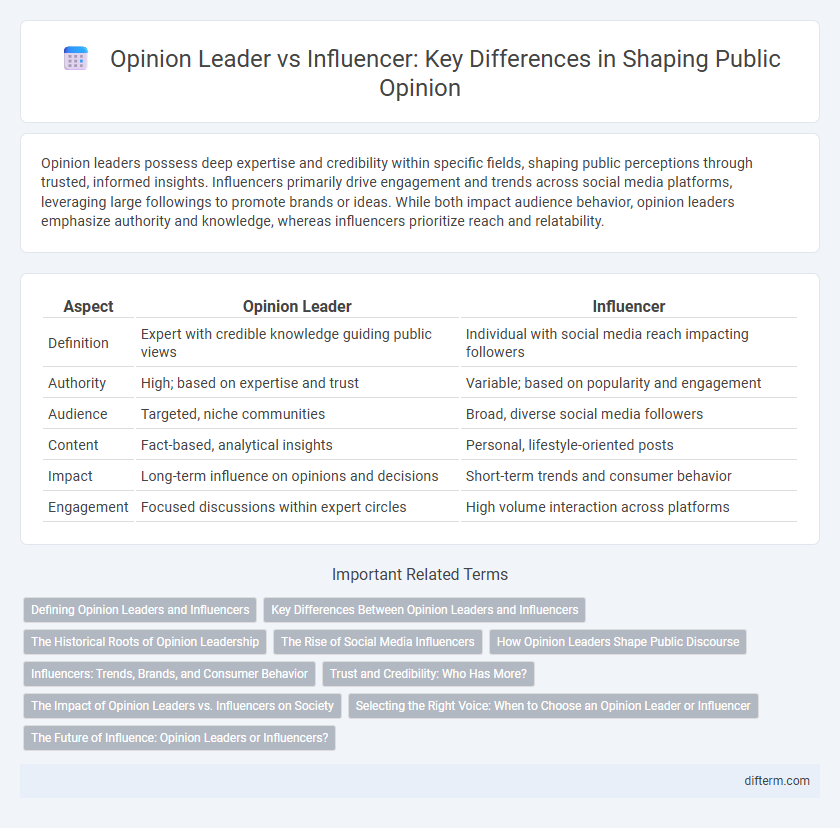Opinion leaders possess deep expertise and credibility within specific fields, shaping public perceptions through trusted, informed insights. Influencers primarily drive engagement and trends across social media platforms, leveraging large followings to promote brands or ideas. While both impact audience behavior, opinion leaders emphasize authority and knowledge, whereas influencers prioritize reach and relatability.
Table of Comparison
| Aspect | Opinion Leader | Influencer |
|---|---|---|
| Definition | Expert with credible knowledge guiding public views | Individual with social media reach impacting followers |
| Authority | High; based on expertise and trust | Variable; based on popularity and engagement |
| Audience | Targeted, niche communities | Broad, diverse social media followers |
| Content | Fact-based, analytical insights | Personal, lifestyle-oriented posts |
| Impact | Long-term influence on opinions and decisions | Short-term trends and consumer behavior |
| Engagement | Focused discussions within expert circles | High volume interaction across platforms |
Defining Opinion Leaders and Influencers
Opinion leaders are individuals recognized for their expertise, credibility, and authoritative voice within specific domains, shaping public attitudes and guiding community decisions. Influencers primarily rely on their social media presence and follower engagement to promote products, trends, or ideas, often prioritizing reach over deep expertise. The distinction lies in opinion leaders' trust-based influence rooted in knowledge versus influencers' impact driven by popularity and digital connections.
Key Differences Between Opinion Leaders and Influencers
Opinion leaders shape public perceptions through expertise and trusted authority within specific communities, whereas influencers primarily leverage social media reach and personality to engage large audiences. While opinion leaders base their influence on credibility and deep knowledge in niche areas, influencers rely heavily on follower numbers and content appeal to drive trends and consumer behavior. The distinction lies in the source of authority: opinion leaders gain respect through expertise, influencers through visibility and relatability.
The Historical Roots of Opinion Leadership
Opinion leadership traces back to early 20th-century communication theories where certain individuals influenced public behavior through trusted knowledge and social connections. Unlike modern influencers who often rely on digital platforms for mass reach, opinion leaders traditionally shaped opinions through interpersonal communication and community roles. This historical foundation highlights opinion leaders as credible, knowledge-based figures with enduring influence in shaping societal attitudes.
The Rise of Social Media Influencers
The rise of social media influencers has transformed traditional opinion leadership by shifting the focus from expertise to personal connection and relatability. Influencers leverage platforms like Instagram and TikTok to engage niche audiences with authentic content, often driving consumer behavior more effectively than established opinion leaders. This evolution emphasizes trust and accessibility over formal authority, reshaping how opinions shape trends and brand perceptions in the digital age.
How Opinion Leaders Shape Public Discourse
Opinion leaders shape public discourse by providing expert insights and trusted perspectives that guide community attitudes and behaviors. Unlike influencers who often rely on popularity and personal branding, opinion leaders base their influence on credibility, experience, and knowledge within specific domains. Their ability to frame issues and interpret information critically impacts public understanding and decision-making processes.
Influencers: Trends, Brands, and Consumer Behavior
Influencers shape consumer behavior by leveraging social media platforms to create authentic connections and drive trends across diverse demographics. Brands collaborate with influencers to boost engagement and enhance credibility, resulting in targeted marketing campaigns that directly influence purchasing decisions. The evolving landscape of influencer marketing reflects a shift towards micro-influencers, whose niche audiences yield higher trust and conversion rates compared to traditional opinion leaders.
Trust and Credibility: Who Has More?
Opinion leaders often have more trust and credibility than influencers due to their expertise, long-standing reputation, and deeper connections with their audience. While influencers may boast larger followings and higher engagement rates, their perceived authenticity can sometimes be questioned because of frequent brand partnerships. Trust in opinion leaders is rooted in perceived knowledge and impartiality, making their endorsements more influential in shaping public opinion.
The Impact of Opinion Leaders vs. Influencers on Society
Opinion leaders exert a deeper, more sustained impact on societal attitudes and behaviors due to their perceived expertise and credibility within specific communities. Influencers often drive trends through broad digital reach and emotional appeal, yet their influence tends to be more transient and commercially driven. This distinction highlights opinion leaders as catalysts for long-term cultural shifts, while influencers shape immediate consumer preferences and social conversations.
Selecting the Right Voice: When to Choose an Opinion Leader or Influencer
Selecting the right voice depends on campaign goals and audience engagement; opinion leaders offer credibility and deep expertise ideal for complex topics, while influencers provide broad reach and relatable content suitable for trend-driven promotions. For industries requiring trust and authority, partnering with opinion leaders enhances brand reputation and consumer confidence. Conversely, influencers excel in driving awareness and quick engagement among younger, social media-savvy demographics.
The Future of Influence: Opinion Leaders or Influencers?
Opinion leaders traditionally shape public perspectives through expertise and credibility, while influencers leverage social media reach and personal branding for rapid engagement. The future of influence will likely blend these roles as audiences seek authentic connections paired with trusted insights. Brands that harness the authoritative voice of opinion leaders alongside influencers' dynamic content will dominate evolving digital landscapes.
opinion leader vs influencer Infographic

 difterm.com
difterm.com